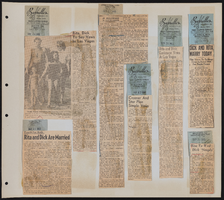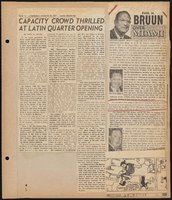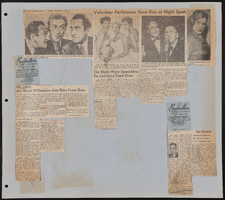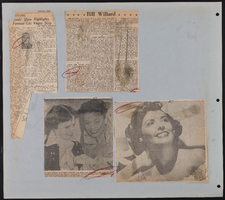Search the Special Collections and Archives Portal
Search Results
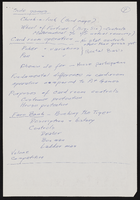
Regional subject files, 1859, 1908, 1970-2015
Level of Description
Scope and Contents
The regional subject files include materials collected by anthropologist Katherine Spilde about Native American gaming, Native American communities in the United States, and the US and international gaming industries. The materials date from 1859 to 2015, with the bulk of materials dating from 1990 to 2010. Materials dating from the nineteenth and early twentieth centuries are a reproduction of a federal treaty and an ethnohistorical essay. The majority of the materials document Native American gaming following the passage of the 1988 Indian Gaming Regulatory Act. The papers include research and subject files created by Dr. Spilde during her employment with the National Gambling Impact Study Commission (NGISC), National Indian Gaming Association (NIGA), and Harvard Project on American Indian Economic Development (HPAIED). The materials document Native American gaming enterprises both on and off reservations, the socioeconomic impact of gaming, the political history of gaming in the US, and international gaming. The series includes socioeconomic reports, testimonies, correspondence, memos, press releases, photographs, audiovisual materials, promotional materials, brochures, fact sheets, summaries, booklets, pamphlets, advertisements, tourism materials, journal articles, legal briefs, legislative documents, court opinions, notes, presentations, conference materials, periodicals, community newspapers, and newspaper articles.
The collection contains documentation on a number of Native American nations, including the Misi-zaaga'iganiing Anishinaabeg (Minnesota Chippewa Tribe, Mille Lacs Band); Gaa-waabaabiganikaag Anishinaabeg (Minnesota Chippewa Tribe, White Earth Band); Forest County Bodéwadmi (Forest County Potawatomi Community); Ho-Chunk Nation of Wisconsin; Mashantucket Pequot Indian Tribe; Mohegan Tribe of Indians; Tulalip Tribes of Washington; Sisseton-Wahpeton Oyate of the Lake Traverse Reservation; Standing Rock Sioux Tribe of North and South Dakota; Mandan, Hidatsa, and Sahnish (Arikara) (Three Affiliated Tribes of the Fort Berthold Reservation, North Dakota); and Mississippi Band of Choctaw Indians. Other communities are also represented in the series, but to a lesser extent. In addition to materials about gaming and casinos, Dr. Spilde also collected documents, photographs, and audiovisual materials about Native American culture in general. The series documents regional and national trends in Native American gaming, and the greater gaming industry. Materials trace federal and state relationships with individual Native American nations, specifically concerning gaming enterprises.
Archival Collection
Collection Name: Katherine A. Spilde Papers on Native American Gaming
Box/Folder: N/A
Archival Component

Transcript of interview with Donald E. Klinker by Barbara Fidelman, February 13, 1975
Date
Archival Collection
Description
On February 13, 1975, Barbara Fidelman interviewed former Caesar’s Palace cage manager, Donald E. Klinkner (born November 28th, 1935 in Los Angeles, California) in his home about his life and perspectives on Southern Nevada. The two discuss the different recreational activities that Klinker participated in during the fifties and sixties. The interview concludes with Klinkner explaining the misconceptions that tourists have about Las Vegas, Nevada.
Text

Virginia T. Lanier interview, March 16, 1981: transcript
Date
Archival Collection
Description
From the Ralph Roske Oral History Project on Early Las Vegas collection OH-01060. On March 16, 1981, collector Heidi G. Hughes speaks to Virginia T. Lanier at the collector’s home in Las Vegas, Nevada. Lanier talks about living on the Strip in Las Vegas, Nevada in the 1950’s and 1960’s. She speaks about her experiences riding the bus, working in food service, and what the Strip was like during the time period.
Text

Transcript of interview with Jacqueline Evans by Susan Rapport, March 15, 1981
Date
Archival Collection
Description
On March 15, 1981, Susan Rapport interviewed Jacqueline Evans (born 1940 in Long Beach, California) about her experiences in Nevada. Evans first talks about living in Reno and Tonopah before moving to Las Vegas where she attended high school. She talks specifically about her extracurricular activities in high school, recreational activities, and other forms of entertainment. The two also discuss political events during the sixties, her husband’s involvement in Indian affairs, and the flood problem in Las Vegas. Evans also talks about bringing children up in Las Vegas, camping as a recreational activity, and the development of Lake Mead.
Text
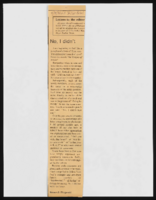
"The Reintegration of Las Vegas": paper by Roosevelt Fitzgerald
Date
Archival Collection
Description
From the Roosevelt Fitzgerald Professional Papers (MS-01082) -- Unpublished manuscripts file. Presented at the Western Social Science Association, 31st Annual Conference, Albuquerque, New Mexico.
Text

